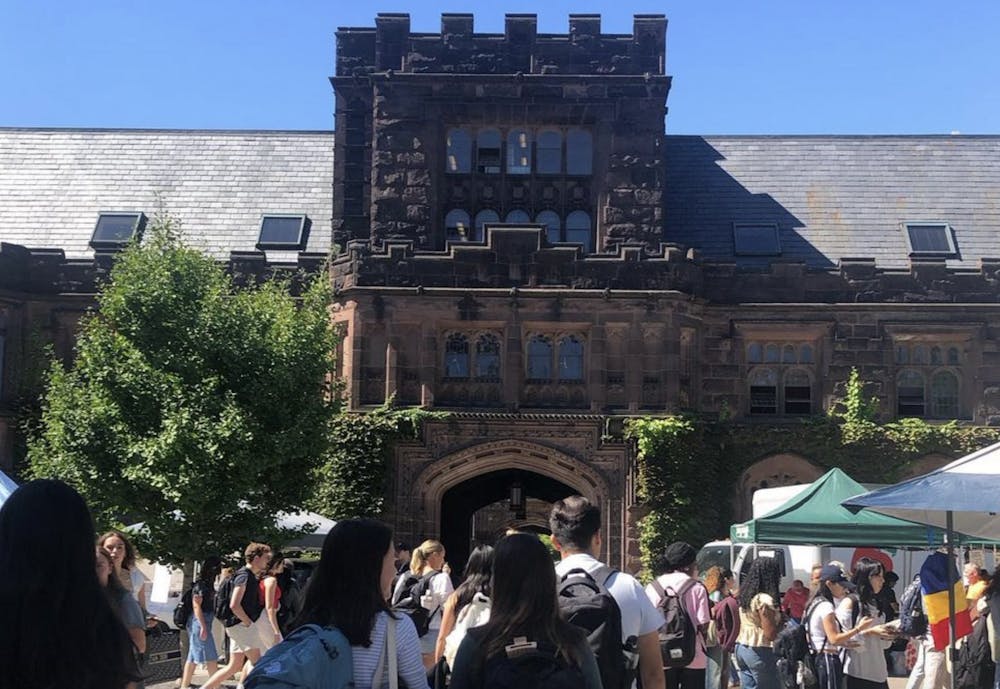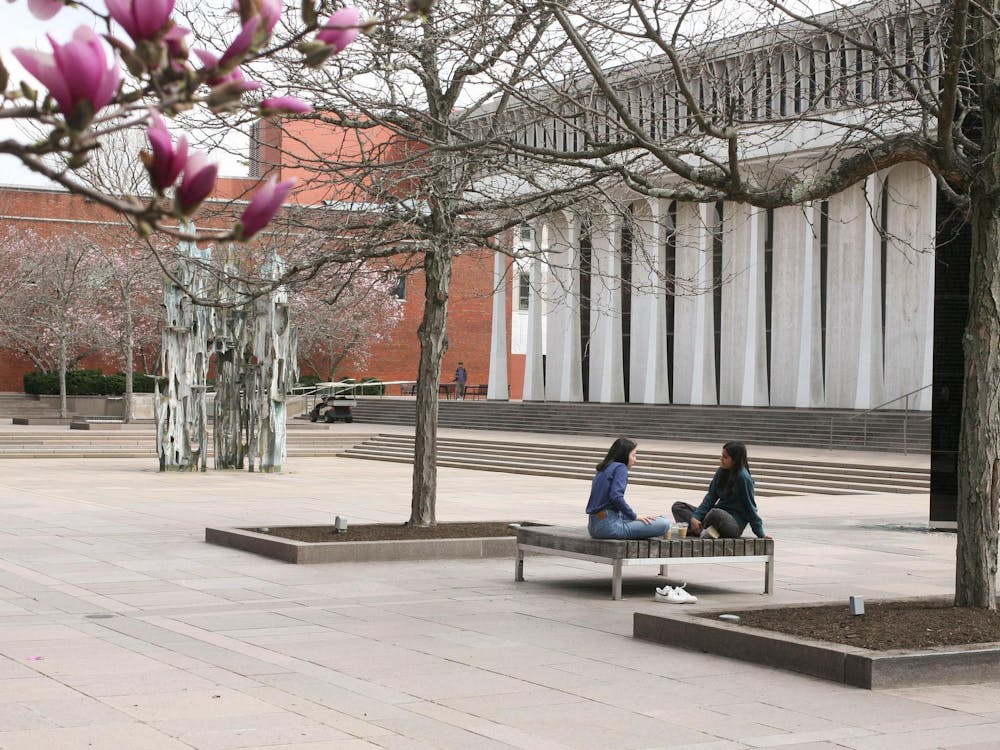In the dead of winter, Firestone Plaza is always empty — spare the usual pedestrians. But as the seasons change, tents crop up weekly filled with fresh fruit, artisanal goods, and handmade crafts. The Princeton University Farmers’ Market, held during the early fall and late spring, brings these goods to campus — an exchange formed to strengthen ties between the University and the community beyond Fitz-Randolph gate.
The program is led by the Princeton University Farmers Market (PUFM) Committee — a joint effort between the Office of Sustainability, the Office of Campus and Regional Affairs, and student leaders. The committee invites the local vendors that serve students and community members every Wednesday to campus.
“We wanted a way to bring local producers and small businesses to campus to make it accessible for students. We’re aware that a lot of students may not have access to vehicles or may not be able to venture too far off of central campus, so the market brings it straight to them,” Sustainability Engagement Program coordinator Kitty Helm told the ‘Prince.’ Helm has overseen the farmers’ market since she joined the Office of Sustainability over two years ago.
“Our hope is that as they’re walking between classes, trying to get some time outside, or even just meeting up with friends, that they come here and interact with these vendors,” she added.
The Orange Bubble is not exactly known for its farm-to-market options within walking distance, so the farmers’ market fills a critical gap in the retail landscape on Nassau for students. While small businesses line Nassau and Witherspoon, the farmers’ market offers choices beyond these familiar establishments, diversifying Princeton’s culinary and retail scene.
As popular as this event is among students, faculty, and community members, there was a time on Princeton’s campus when it wasn’t a reality. Due to lockdown restrictions during the COVID-19 pandemic, the farmers’ market was halted, along with much of campus life.
When Anna Pinkerton ’24 returned to campus following the pandemic, she felt the absence of a farmers’ market in her life.
“I grew up partly outside D.C. and also spent a lot of time growing up in Vermont,” Pinkerton said. “Farmers’ markets are a big deal there and so they’ve been a pretty big part of growing up. When I got to campus my sophomore year, I wanted to be a part of a community and involved on campus, especially after a year of nothing.”
When she received an email gauging interest in planning a return of the farmers’ market, Pinkerton knew she wanted to be involved. Pinkerton, alongside the Office of Sustainability and the Office of Campus and Regional Affairs, worked together to reestablish the market in a post-pandemic Princeton.
“Working on this project gave me the chance to see how a few one or two people can make a really big difference on campus,” Pinkerton said. “I haven’t realized that something that big could be achieved with just a few dedicated people.”
Genevieve Shutt ’26, the current president of PUFM, coordinates vendor outreach and helps run the market days, which involve setup and greeting students in Firestone Plaza.
“This part of campus is really great and especially on the nice days of early fall and late spring,” Shutt said. “We get a lot of great traffic of students just passing through, and it brings a great presence to the school.”

Firestone Plaza, which channels students from Rockefeller College, Mathey College, and Nassau Street to Firestone Library, McCosh Hall, and points beyond, is an ideal location for the market. It’s hard to miss the colorful tents and vibrant street activity of the market when walking anywhere around the north of campus.
This year’s rotation of vendors that Shutt has worked to bring to campus includes flavors and treats both familiar and new. Fan favorites such as Catalina’s Empanadas, Sprouts Flowers, Terhune Orchards, and Nutty Novelties bustle with returning customers, with Ooika Matcha and Ice Dreamz joining as new additions.
Through the wide mix of vendors present at the market, establishments and owners near and far come to bring a variety of goods to the Princeton community.
“The farmers market is a really cute thing to look forward to every week,” Navani Rachumallu ’26 said. “I really love the apple cider from Terhune Orchards, especially because I grew up nearby, so it’s really nice to have such a familiar homemade staple every week.”
While Terhune is a local favorite, other market highlights have roots far away. Having immigrated from Chile, Catalina Jimenez of Catalina’s Empanada sought to bring the comforting flavors of her homeland to the Princeton area. Jimenez, along with her husband Mikl Hajek, started a coffee shop in 2012, which ultimately closed because of inflated real estate prices. In 2017, the duo then pivoted to starting their restaurant in Hopewell.
“For vendors like us, this isn’t just a job or a business. It’s our livelihood and purpose,” Hajek said. “The Princeton market is a really comfortable place to be. All the vendors get along really well and interacting with students is always pleasant. They’re grateful and they’re gracious; it’s just a great place to set up shop.”
While the farmers’ market is spatially accessible to Princeton students, it also works to make it financially affordable for every Princeton student. PUFM has collaborated with the Undergraduate Student Government to create its voucher system, which offers more than a hundred five-dollar coupons to students on a first-come-first-serve basis each week. In turn, many students can receive an item for free or purchase goods at a lower cost.
“We do our best to ensure that the market is accessible and affordable for all,” Helm said. “Students love the vouchers, and that’s been a huge success.”
The market organizers said they hope this financial incentive will encourage students to engage with the broader Princeton community, bridging the divide between town and gown.
“I hope that it makes students realize that like Princeton is not just this little town, that there really is a world outside of campus,” Pinkerton said. “Farmers’ markets create this really cool opportunity to be able to meet the people that are creating like the product, it’s a lot more of a personal and informative experience than going to the grocery store.”
Sedise Tiruneh is a contributing Features writer and staff writer for the Prospect.
Please send any corrections to corrections[at]dailyprincetonian.com.








